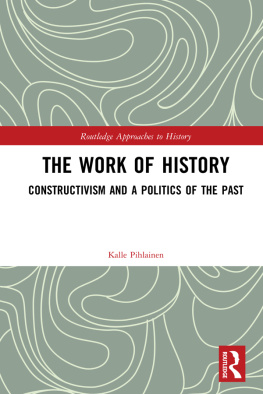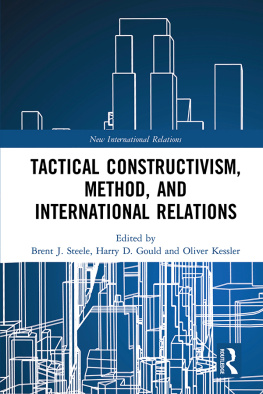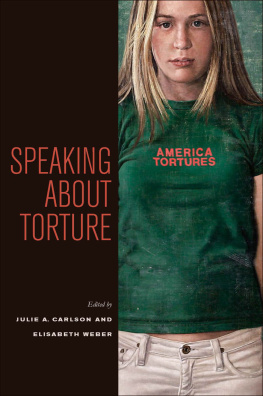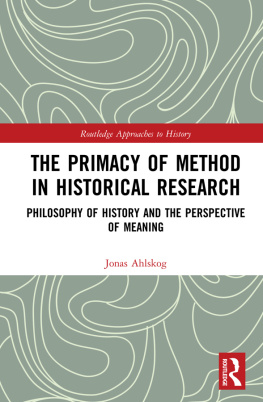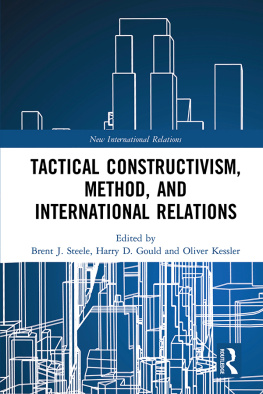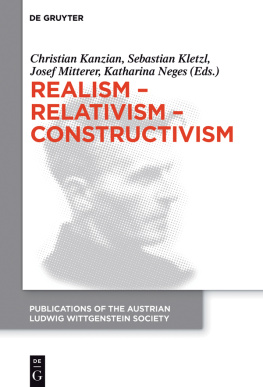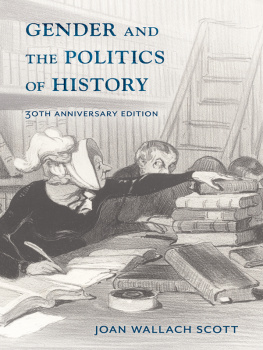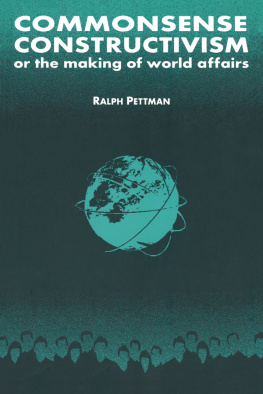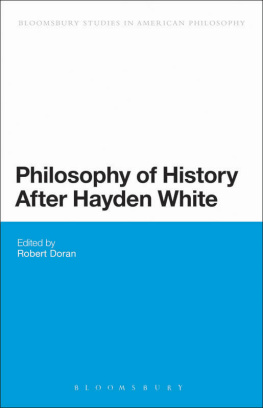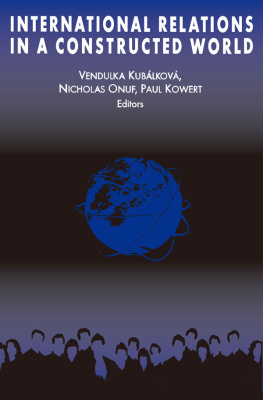The Work of History
Since the appearance of Hayden Whites seminal work Metahistory in 1973, constructivist thought has been a key force within theory of history and has at times even provided inspiration for historians more generally. Despite the radical theoretical shift marked by constructivism and elaborated in detail by its proponents, confusion regarding many of its practical and ethical consequences persists, however, and its position on truth and meaning is routinely misconstrued. To remedy this situation, The Work of History seeks to mediate between constructivist theory and history practitioners intuitions about the nature of their work, especially as these relate to the so-called factfiction debate and to the literary challenges involved in the production of historical accounts. In doing so, the book also offers much-needed insight into debates about our experiential relations with the past, the political use of history and the role of facts in the contestation of power.
Kalle Pihlainen is a Senior Research Fellow at the School of Humanities at Tallinn University, Estonia, and Adjunct Professor of Philosophy and Cultural Theory at bo Akademi University, Finland.
Routledge Approaches to History
For a full list of titles in this series, please visit www.routledge.com
15 Theoretical Perspectives on Historians Autobiographies
From Documentation to Intervention
Jaume Aurell
16 How History Works
The Reconstitution of a Human Science
Martin L. Davies
17 History, Ethics, and the Recognition of the Other
A Levinasian View on the Writing of History
Anton Froeyman
18 The Historiography of Transition
Critical Phases in the Development of Modernity (14941973)
Edited by Paolo Pombeni
19 The Emergence of Historical Forensic Expertise
Clio Takes the Stand
Vladimir Petrovi
20 Historical Mechanisms
An Experimental Approach to Applying Scientific Theories to the Study of History
Andreas Boldt
21 Values, Objectivity, and Explanation in Historiography
Tor Egil Frland
22 The Work of History
Constructivism and a Politics of the Past
Kalle Pihlainen
First published 2017
by Routledge
711 Third Avenue, New York, NY 10017
and by Routledge
2 Park Square, Milton Park, Abingdon, Oxon OX14 4RN
Routledge is an imprint of the Taylor & Francis Group, an informa business
2017 Taylor & Francis
The right of Kalle Pihlainen to be identified as author of this work has been asserted in accordance with sections 77 and 78 of the Copyright, Designs and Patents Act 1988.
All rights reserved. No part of this book may be reprinted or reproduced or utilised in any form or by any electronic, mechanical, or other means, now known or hereafter invented, including photocopying and recording, or in any information storage or retrieval system, without permission in writing from the publishers.
Trademark notice: Product or corporate names may be trademarks or registered trademarks, and are used only for identification and explanation without intent to infringe.
Library of Congress Cataloging-in-Publication Data
A catalog record for this book has been requested
ISBN: 978-1-138-69746-1 (hbk)
ISBN: 978-1-315-52161-9 (ebk)
Typeset in Sabon
by Apex CoVantage, LLC
Hayden White
I commend this book as a lucid, pertinent and sophisticated treatment of some principal issues currently debated by philosophically interested scholars in a wide variety of fields in the humanities and social sciences. It uses some of my own work as exemplary statements of these issues, less to promote them than to complicate them through critical scrutiny. The kind of reader of histories served by mainstream book review periodicals is not likely to find such philosophically interested discussions either engaging or particularly relevant to his or her daily concerns. In other words, this is a book written by a professional critic-scholar-philosopher, not for the common reader, but for others of his kind.
This brings me to an important point about current discussion of the humanities in the Western educational enterprise. Historylike literary studies, linguistics, philosophy and certain branches of the social sciences, such as anthropology, and sociology and psychologyhas moved further and further away from its traditional readers interests the more it has tried to turn itself into a science on the model of modern biology, physics, neurology and so on. For: the transformation of a field of study formerly serving group interests (education, identity, ideology, genealogy) into a scientific discipline inevitably raises a host of meta-interests, such as the nature of the object of study, the appropriate modes of representing this object and explaining changes in it over time, the difference between conventional interpretational strategies and newer, more scientific modes of explanation, the nature of the codes used in preliminary descriptions of the object and the competences required for participation in discussions of topics such as these.
For a long time, history was regarded as the study of the past as it was known by way of documents and monuments and in the extent to which it could provide credible stories of the formation of a nations (or some other groups) identity and development over time. Any educated person was considered to be competent to read such stories, derive a moral from thoughtful reflection on them and gain insight into the groups nature and ends on the basis of which a realistic grasp of historical reality could be composed. And so too for those who wrote history: any educated person with the necessary languages and experience (in public affairs) was regarded as competent to study history and write about it authoritatively.
But all this changed with the effort in the early nineteenth century to transform history into a science and locate the proper practice of it in the university. Henceforth, a wedge was driven between the professional historian and the amateur and beyond both, the common reader of histories. Often, this wedge consisted simply of the possession of an advanced degree attesting to the expertise of the person possessing it. But it also consisted of the creation of a new primary audience for historians, namely, other professionals competent to pronounce on the propriety of any study or account of the past claiming the title of a history. Finally, the professionalization of history created a wedge between those historians concerned to create a scientific account of the past and those who continued to favor the older, traditional mode of storytelling (or narrative), considered to be a mode of explaining history particularly suited to the needs and interests of the ordinary, educated citizen of the modern nation-state, religious denomination or member of a distinctive social class.
Now, this brings us to the peculiar situation of the audience, context or milieu into which Kalle Pihlainens book has been launched. Although this is a book about the study of history, it is less concerned with history (that part of the past that can be studied by professional historians); it is much more a book about the kind of knowledge we can derive from the study of history, the ontological status of the historiological object, the different ways this history can be presented or represented and the kind of audience that historians and their critics can realistically envision for their work. Thus, Pihlainen leads us through current states of the questions of narrative (storytelling) as a realistic (or, conversely) fictionalizing mode of discourse; how a narrative or other kind of figurative device refers; whether historians can avoid fictionalizing their objects of study and telling stories about them; whether certain kinds of events in the remote or near past require specific kinds of representational strategies for the proper presentation of their substance or essencetheir meaning; and whether there is currently a yearning for the past pervading our cultural moment and, if so, whether this desire is a realistic one or not.

